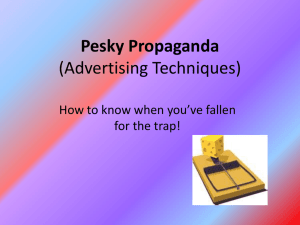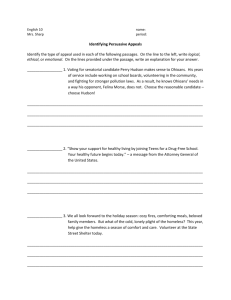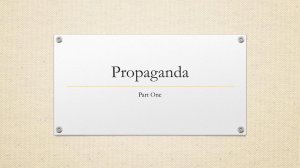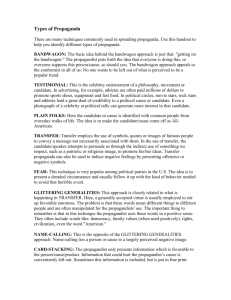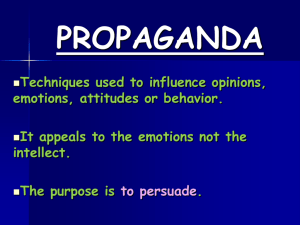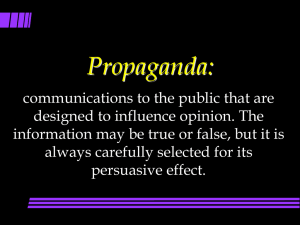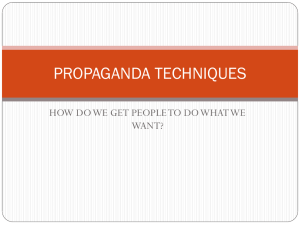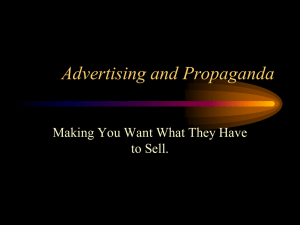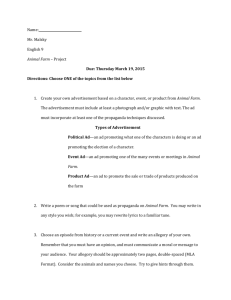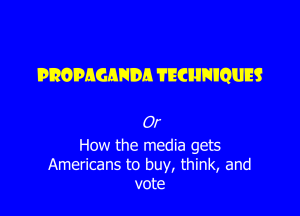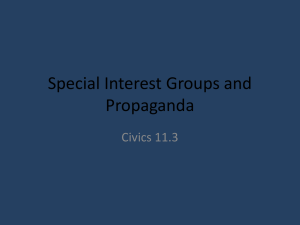propaganda PowerPoint
advertisement
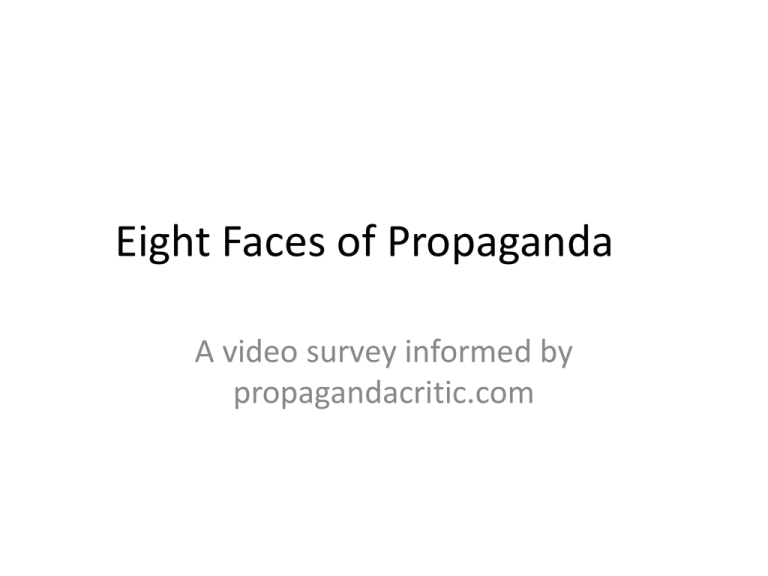
Eight Faces of Propaganda A video survey informed by propagandacritic.com What is propaganda? • Propaganda, simply put, is persistent persuasive messaging. It includes: – Ads ads ads. • It resists: – The give and take of argument: i.e., critical thinking. • It does this by manipulating: – Symbols – Emotions Propaganda connotes malevolence, but it is a neutral tool. Not necessarily good. Not necessarily evil. Word Games Types of Propaganda. Many types of propaganda, but we will focus on 8 key types identified by the Institute for Propaganda Analysis. The concepts in this PowerPoint come from propagandacritic.com. The example locations are indicated throughout. – Name-calling – Glittering generalities – Euphemisms False Connections – Transfer – Testimonial Special Appeals – Plain folks – Bandwagon – Fear Name calling. • Definition: a device that “links a person, or idea to a negative symbol.” • Effective how? The intended audience may reject the person or idea on the basis of the negative symbol. • Examples: the words “hobo,” “queer,” “terrorist,” etc., have negative connotations added through the years. Name calling antidotes: ask yourself… • What does the name mean? • Does the idea in question have a legitimate connection with the real meaning of the name? • Is an idea that serves my best interests being dismissed through giving it a name I don't like? • Leaving the name out of consideration, what are the merits of the idea itself? Name calling example. • “Boys Beware,” a 1950’s anti-gay propaganda film. • http://www.youtube.com/watch?v=A5VNe9N TOxA Glittering generalities. • Definition: a device that uses “virtue words” in association with the person or idea being promoted: e.g., “democracy,” “good,” “motherhood,” “fatherhood,” etc. • Effective how? Audience supplies its own definitions for the “glittering” quality and applies it to the object of promotion, making it seem virtuous. Glittering generalities antidote: ask yourself… • What does the “virtue word” really mean? • Does the idea in question have a legitimate connection with the real meaning of the word: • Is an idea that does not serve my best interests being "sold" to me merely through its being given a name that I like? • Leaving the “virtue word” out of consideration, what are the merits of the idea itself? Glittering generalities example. • “Army strong” commercial, 2009. • http://www.youtube.com/watch?v=cqZVIZJaI8&feature=related Euphemisms. • Definition: a device that attempts to make a potentially unpleasant reality more palatable. • Effective how? Audience is shielded from factual perception of the person or idea for which euphemism is being employed. • Example: “collateral damage” is the term the military uses for civilian casualties – civilians who are killed in a war zone. Euphemism example. • “High Fructose Corn Syrup” ad, 2008. • http://www.youtube.com/watch?v=EEbRxTOy Gf0 Transfer. • Definition: a device by which the authority or prestige of something we respect is carried over to the person or idea being promoted. Symbols are used heavily to achieve this: the cross, American flag, etc. • Effective how? The symbols deployed act as a sort of short-hand. • Example: “doctors” in white lab coats to suggest that a cold medicine is effective. Transfer antidotes: ask yourself… • In the most simple and concrete terms, what is the proposal of the speaker? • What is the meaning of the thing from which the propagandist is seeking to transfer authority, sanction, and prestige? • Is there any legitimate connection between the proposal of the propagandist and the revered thing, person or institution? • Leaving the propagandistic trick out of the picture, what are the merits of the proposal viewed alone? Transfer example. • “Volkswagen Commercial: the Force,” 2011. • http://www.youtube.com/watch?v=R55euHQna0 • “Firework,” Katy Perry, 2011. • http://www.youtube.com/watch?v=QGJuMBd aqIw Testimonial. • Definition: a device that uses an outside source (like a celebrity) to confer legitimacy for a person, product or idea. • Effective how: audience is manipulated by the appeal to an illegitimate authority. • Example: Oprah Winfrey supported Barak Obama for his presidential campaign, but for what reason should we believe she knows what is best for the country? Testimonial antidotes: ask yourself… • Who or what is quoted in the testimonial? • Why should we regard this person (or organization or publication) as having expert knowledge or trustworthy information on the subject in question? • What does the idea amount to on its own merits, without the benefit of the Testimonial? Testimonial example. • “The Official Justin Bieber Proactiv Commercial,” 2010. • http://www.youtube.com/watch?v=hyET522r KMA Plain folks. • Definition: a device that uses “ordinary people” to offer testimony on behalf of a person, idea or thing. • Effective how? The device helps to convince audience that the object of promotion is “of the people.” • Example: “America's recent presidents have all been millionaires, but they have gone to great lengths to present themselves as ordinary citizens. Bill Clinton ate at McDonald's and confessed a fondness for trashy spy novels. George Bush Sr. hated broccoli, and loved to fish. Ronald Reagan was often photographed chopping wood, and Jimmy Carter presented himself as a humble peanut farmer from Georgia.” Plain folks antidotes. • What are the propagandist's ideas worth when divorced from his or her personality? • What could he or she be trying to cover up with the plain-folks approach? • What are the facts? Plain folks example. • “Yes on Proposition 8 Commercial,” 2009. • http://www.youtube.com/watch?v=Y4nqtDrJI 7A Bandwagon. • Definition: a device that suggests “everyone else is doing it, and so should you.” • Effective how? People adore a crowd and do not want to be left out of groups. • Example: “Big Bang Hite Beer,” 2009. Bandwagon antidotes. • What is this propagandist's program? • What is the evidence for and against the program? • Regardless of the fact that others are supporting this program, should I support it? • Does the program serve or undermine my individual and collective interests? Bandwagon example. • “Prop 8, the Musical,” 2009. • http://www.youtube.com/watch?v=B_hyT7_B x9o&feature=related
